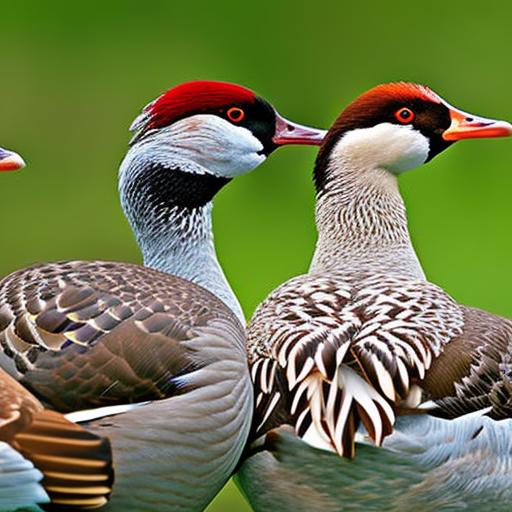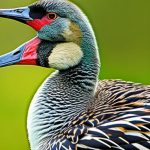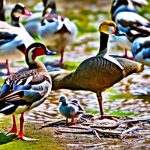Geese have been domesticated for thousands of years and are an important part of poultry farming around the world. They are known for their distinctive honking sound, long necks, and webbed feet. Geese are raised for their meat, eggs, and feathers, and they also play a role in sustainable farming practices. There are many different breeds of geese, each with its own unique characteristics and traits. In this article, we will explore the history, origins, and importance of geese poultry breeds, as well as their role in agriculture, conservation, and culture.
The History and Origins of Toulouse Geese
Toulouse geese are one of the oldest and most popular breeds of domestic geese. They originated in the city of Toulouse, France, and were first bred for their meat and feathers. Toulouse geese are known for their large size, with males weighing up to 26 pounds and females up to 20 pounds. They have a distinctive grey plumage and are known for their calm and gentle temperament. Toulouse geese were first imported to the United States in the 1850s and quickly became a popular breed for meat production. Today, Toulouse geese are raised on farms around the world and are valued for their high meat yield and excellent foraging abilities.
Toulouse geese are also known for their strong maternal instincts and are often used as foster mothers for other poultry species. They are excellent at hatching and raising goslings, and are known for their protective nature. Toulouse geese are also popular for their down feathers, which are used in pillows, comforters, and other bedding products. Overall, Toulouse geese have a rich history and continue to be an important breed in the poultry industry.
The Characteristics and Traits of Embden Geese
Embden geese are another popular breed of domestic geese, known for their large size and distinctive white plumage. They originated in the town of Embden in Germany and were first imported to the United States in the 1820s. Embden geese are valued for their meat production, with males weighing up to 30 pounds and females up to 20 pounds. They are also known for their calm and friendly temperament, making them a popular choice for small farms and homesteads.
Embden geese are excellent foragers and are able to thrive on pasture and open range. They are also known for their strong maternal instincts and are often used as foster mothers for other poultry species. Embden geese are also popular for their down feathers, which are used in bedding products and insulation. Overall, Embden geese are a versatile and valuable breed, known for their meat production, foraging abilities, and gentle nature.
Understanding the Different Varieties of Geese Poultry Breeds
There are many different varieties of geese poultry breeds, each with its own unique characteristics and traits. Some of the most popular breeds include the Chinese, African, and Sebastopol geese. Chinese geese are known for their distinctive knob at the base of their beak and are valued for their meat and egg production. African geese are a smaller breed, known for their excellent foraging abilities and calm temperament. Sebastopol geese are known for their curly feathers and are valued for their ornamental appearance.
In addition to these popular breeds, there are many other varieties of geese, each with its own unique traits and characteristics. Some breeds are valued for their meat production, while others are raised for their eggs, feathers, or ornamental value. Understanding the different varieties of geese poultry breeds is important for farmers and homesteaders looking to raise geese for meat, eggs, or other products.
The Role of Geese in Sustainable Farming Practices
Geese play an important role in sustainable farming practices, as they are excellent foragers and can thrive on pasture and open range. They are able to graze on grass, weeds, and other vegetation, helping to control pests and improve soil health. Geese also produce high-quality meat, eggs, and feathers, making them a valuable addition to small farms and homesteads. In addition, geese are known for their strong maternal instincts and are often used as foster mothers for other poultry species, helping to increase overall productivity on the farm.
Geese are also an important part of integrated farming systems, where they are raised alongside other livestock and crops. They can help to control weeds and pests in fields and orchards, reducing the need for chemical pesticides. Geese also produce high-quality manure, which can be used to fertilize crops and improve soil fertility. Overall, geese play a valuable role in sustainable farming practices, helping to improve soil health, control pests, and increase overall productivity on the farm.
Tips for Raising and Caring for Geese Poultry Breeds
Raising and caring for geese poultry breeds requires some specific knowledge and skills. Geese need access to fresh water for drinking and bathing, as well as plenty of space to graze and forage. They also need protection from predators, such as foxes, raccoons, and birds of prey. Providing a secure shelter and fencing is important for keeping geese safe and healthy. Geese also need a balanced diet, including grass, grains, and commercial feed, to ensure they receive the proper nutrients for growth and development.
It is also important to provide proper care and attention to geese during the breeding and nesting season. Female geese need a quiet and secluded area to build their nests and lay their eggs, and they should be protected from disturbances and predators. It is also important to monitor the health and well-being of geese regularly, looking for signs of illness or injury. Overall, raising and caring for geese poultry breeds requires dedication and attention to detail, but the rewards of high-quality meat, eggs, and feathers make it a valuable endeavor for farmers and homesteaders.
Geese Poultry Breeds in Agriculture and Conservation
Geese poultry breeds play an important role in agriculture and conservation, as they are able to thrive on pasture and open range, helping to control pests and improve soil health. They are also an important part of integrated farming systems, where they are raised alongside other livestock and crops, helping to reduce the need for chemical pesticides and fertilizers. Geese also play a role in conservation efforts, as they can help to control invasive plant species and restore natural habitats.
In addition, geese are an important part of traditional farming practices in many cultures around the world, where they are valued for their meat, eggs, and feathers. By raising and caring for geese poultry breeds, farmers and homesteaders can help to preserve traditional farming methods and support local food systems. Overall, geese play a valuable role in agriculture and conservation, helping to improve soil health, control pests, and support sustainable farming practices.
The Culinary and Economic Importance of Geese Poultry Breeds
Geese poultry breeds are valued for their high-quality meat, which is known for its rich flavor and tender texture. Goose meat is a popular choice for holiday meals and special occasions, and is often used in traditional dishes around the world. In addition to meat, geese also produce high-quality eggs, which are valued for their rich flavor and nutritional value. Goose eggs are often used in baking and cooking, and are a popular choice for making pastries and desserts.
Geese are also valued for their down feathers, which are used in pillows, comforters, and other bedding products. Goose down is known for its excellent insulation and softness, making it a popular choice for luxury bedding items. In addition, geese are often raised for their ornamental value, as they are a popular choice for farm and homestead settings. Overall, geese poultry breeds play an important role in the culinary and economic sectors, providing high-quality meat, eggs, and feathers for consumers around the world.
Geese Poultry Breeds in Art, Literature, and Folklore
Geese have long been a source of inspiration in art, literature, and folklore, and are often associated with qualities such as loyalty, courage, and wisdom. In many cultures, geese are a symbol of family and community, and are often depicted in paintings, sculptures, and other artistic works. Geese are also a popular subject in literature, where they are often featured in fables, myths, and folktales, as well as in children’s stories and nursery rhymes.
In addition, geese are an important part of traditional folklore and customs in many cultures around the world. In some traditions, geese are believed to bring good luck and prosperity, and are often included in celebrations and festivals. Geese are also a popular choice for farm and homestead settings, where they are valued for their ornamental appearance and gentle nature. Overall, geese poultry breeds have a rich cultural significance, and continue to be a source of inspiration in art, literature, and folklore.
The Future of Geese Poultry Breeds: Challenges and Opportunities
The future of geese poultry breeds faces both challenges and opportunities, as the demand for high-quality meat, eggs, and feathers continues to grow. One of the main challenges facing geese farming is the need for sustainable and ethical practices, including access to pasture and open range, as well as humane treatment and care. In addition, there is a need for increased awareness and education about the value of geese poultry breeds, and their role in sustainable farming practices.
However, there are also many opportunities for the future of geese poultry breeds, including the potential for increased demand for high-quality meat, eggs, and feathers. Geese are also a popular choice for integrated farming systems, where they can help to control pests and improve soil health. In addition, geese are an important part of traditional farming practices in many cultures around the world, and can help to support local food systems and preserve traditional farming methods. Overall, the future of geese poultry breeds holds many opportunities for sustainable and ethical farming practices, and the continued value of high-quality meat, eggs, and feathers for consumers around the world.
Meet Walter, the feathered-friend fanatic of Florida! Nestled in the sunshine state, Walter struts through life with his feathered companions, clucking his way to happiness. With a coop that’s fancier than a five-star hotel, he’s the Don Juan of the chicken world. When he’s not teaching his hens to do the cha-cha, you’ll find him in a heated debate with his prized rooster, Sir Clucks-a-Lot. Walter’s poultry passion is no yolk; he’s the sunny-side-up guy you never knew you needed in your flock of friends!







